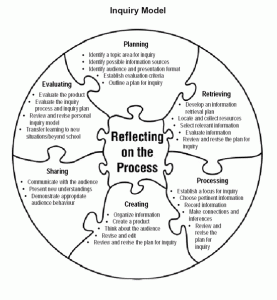Practice Inquiry
 Question: How are you going to know what to inquire on within the following units: agriculture, forensics, personal technologies, and transportation?
Question: How are you going to know what to inquire on within the following units: agriculture, forensics, personal technologies, and transportation?
Use the inquiry model framework to move through your inquiry and gain insight into your curiosities.
Plan: What interests you about each topic?
Retrieve: Find information, review it, evaluate resources.
Processing: Establish focus, choose resources, record, make connections, review and revise your plan for inquiry.
Creating: Organize info., create a product, consider audience, revise and edit.
Sharing: Present new understandings
Evaluating: Evaluate the inquiry process, product, plan. Revise personal inquiry model. Transfer learning to new situation beyond school.
Assessment: Rubric and Project Reflection
*This is an exploration into the four units. We are gaining a little more knowledge/ understanding about each of the four so that we can take our studies further as we move through this course.


